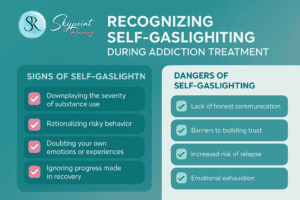Is your inner critic sabotaging your healing process? This article uncovers how gaslighting yourself can quietly stall addiction recovery and how to break free.

Recovery feels hard enough without your own mind working against you. But that’s exactly what happens when you start gaslighting yourself during treatment. You tell yourself your addiction “wasn’t that bad” or convince yourself you’re “making progress” when you’re actually struggling. This internal manipulation can be just as damaging as external gaslighting, quietly undermining your healing process.
The tricky part about self-gaslighting is how normal it feels. Your brain is trying to protect you from uncomfortable truths, so the denial and minimization seem reasonable. But these mental gymnastics can keep you stuck in patterns that prevent real recovery.
Understanding how this happens and learning to recognize the signs can be the difference between genuine healing and just going through the motions of treatment.
Understanding Self-Gaslighting in Addiction Recovery
Self-gaslighting occurs when you manipulate your own perception of reality, often to avoid difficult emotions or truths about your situation. In addiction recovery, this might look like convincing yourself your substance use wasn’t problematic or that you’re handling recovery better than you actually are.
People in addiction recovery self-awareness programs often struggle with this because recovery requires facing uncomfortable realities about past behaviors and current challenges. Your mind naturally wants to protect you from this discomfort, so it creates alternative narratives that feel easier to accept.
The psychological impact runs deep. When you’re consistently lying to yourself about your progress, emotions, or needs, you lose touch with your authentic experience. This disconnection makes it harder to identify triggers, process emotions healthily, or build genuine relationships with others in recovery.
Those seeking sobriety become especially vulnerable to self-gaslighting because addiction already involves significant denial and distorted thinking. These patterns don’t disappear overnight just because you’ve entered treatment. In fact, the pressure to “get better” can sometimes make the self-deception worse.
Common Signs You Might Be Gaslighting Yourself
Recognizing the patterns of self-gaslighting is the first step toward healing. Here are a few red flags:
- You downplay the seriousness of your addiction, saying things like “At least I’m not like those other people.”
- You rationalize risky behavior, blaming stress or circumstances instead of taking accountability.
- You constantly doubt your experiences or emotions, questioning if you’re being “too sensitive.”
- You ignore progress because you fear relapse or believe you don’t deserve to feel proud.
- You tell yourself recovery is pointless because you’ve “messed up too much.”
These thought patterns aren’t just self-critical. They actively block emotional growth and make it harder to stay grounded in your recovery plan.
The Dangers of Gaslighting Yourself in Rehab
Self-gaslighting creates barriers between you and the people trying to help you. When you’re not honest with yourself about your struggles, you can’t be fully honest with counselors, therapists, or support group members. This lack of authentic communication limits the effectiveness of treatment.
Building trust in the recovery process becomes nearly impossible when you’re constantly second-guessing your own experiences. Recovery requires faith that the process works, but self-gaslighting creates doubt about whether treatment is helping or whether you deserve to get better.
The increased risk of relapse represents one of the most serious dangers. If you’re minimizing warning signs, dismissing cravings, or convincing yourself you have more control than you actually do, you’re more likely to put yourself in risky situations or make poor decisions.
Emotional exhaustion becomes a real problem when you’re constantly managing two different versions of reality: the truth and the version you’re telling yourself. This mental strain can intensify existing anxiety or depression, making recovery feel even more overwhelming.
Your self-esteem and motivation to continue treatment suffer when you’re not being honest with yourself. How can you celebrate genuine progress if you’re dismissing it? How can you stay motivated when you’re convinced treatment isn’t working?
Strategies to Overcome Self-Gaslighting During Treatment
The good news? Self-gaslighting is a learned behavior, which means it can be unlearned. Here are tools you can use to shift your mindset and support mental health and addiction treatment:
- Practice mindfulness. Noticing negative self-talk in real time allows you to interrupt it before it spirals.
- Use self-compassion. Be as kind to yourself as you would to a friend in the same situation.
- Work with a therapist. Skilled clinicians trained in cognitive-behavioral therapy addiction can help reframe distorted thinking.
- Build a community. Connect with others who are open about their struggles and victories.
- Set milestones. Celebrate progress even if it’s not perfect. Every step counts.
- Journal honestly. Write down what you’re feeling without censoring it. The page won’t judge you.
Recovery isn’t about perfection. It’s about progress and truthfully seeing where you are.
How Skypoint Recovery Supports Breaking Free from Self-Gaslighting
At Skypoint Recovery in Akron, Ohio, the journey begins with a real conversation—no judgment, no shame. The staff works with you to identify thought patterns and emotional habits that may be keeping you stuck.
We provide:
- Customized programs that address both substance use and co-occurring mental health challenges
- Therapists trained in cognitive-behavioral therapy addiction and trauma-informed care
- Group therapy sessions where openness is encouraged and supported
- A safe space for honest self-reflection through self-compassion in recovery
- Support through Partial Hospitalization (PHP), Intensive Outpatient (IOP), and sober living, depending on your unique needs
Skypoint Recovery is here to walk beside you, helping you build a recovery rooted in truth and resilience. Whether you’re battling overcoming addiction denial or struggling with self-worth, you don’t have to navigate it alone.
Embrace Honesty and Healing Today
Breaking free from patterns of gaslighting yourself requires courage and support. The first step involves recognizing that these patterns exist and understanding how they might be affecting your recovery journey. This recognition alone can be transformative.
Self-compassion in recovery means accepting that you’ve been doing the best you can with the tools you have available. Self-gaslighting often develops as a survival mechanism, so approaching it with understanding rather than judgment creates space for real change.
Skypoint Recovery offers confidential consultations where you can explore these patterns in a safe, non-judgmental environment. Our team understands that overcoming addiction denial and self-deception takes time and specialized support.
You can fill out our confidential online form or call 330-919-6864 to speak with someone who understands that authentic recovery requires honest self-reflection and that breaking free from self-deceptive patterns is an essential part of lasting sobriety and wellness. Your healing deserves the foundation of truth and self-compassion that makes genuine recovery possible.
Related Blogs
-
The Relapse Cycle: Warning Signs Most People Miss Until It’s Too Late
-
How Fear of Dependence Stops People from Using Life‑Saving Medications
-
Is Relapse Part of Recovery? The Truth About Slips, Setbacks, and Long‑Term Sobriety
-
Denial in Substance Misuse: Why Smart People Delay Getting Help
-
Self-Assessment: 10 Questions to Ask Yourself Before Calling an Outpatient Rehab

Freedom Is Just a Call Away
Skypoint Recovery offers personalized treatment programs led by experienced professionals who understand your journey. We’ll help you build the foundation for lasting recovery through evidence-based care tailored to your needs. Your path to healing awaits – reach out for a confidential consultation.








